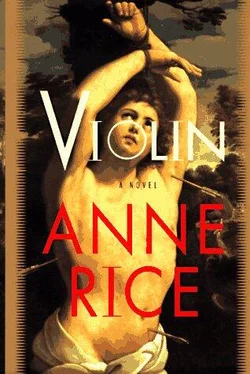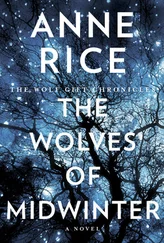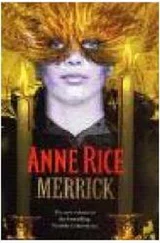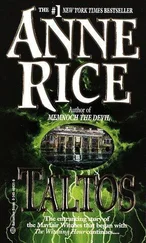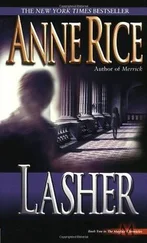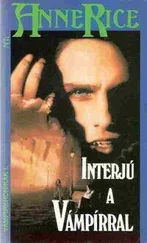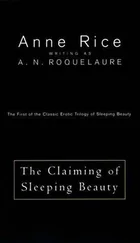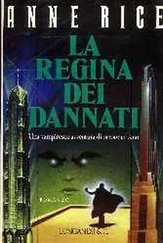He only cried. Finally he lifted his head. Dazzled, he stared at the distant crowd, and only now did the music seem to strike him, to awaken him.
The distant solo violin had broken into a dance, a dance for which there was a name but I couldn't recall it, a country dance which always carries with it in any land som% warning of the destruction inherent in abandon.
Not turning away, only releasing me a little, and looking over his shoulder, he spoke.
"We are in the cemetery, true," he said. He was tired and worn from crying. He held me close again, carefully regarding the violin, not to hurt it, and nothing in his poise or manner suggested he would try to snatch it.
He stared as I did at the distant crowd. He seemed to inhale the power of the leaping music.
"But this is Venice, Triana," he kissed my ear. He gave some soft moan like a wounded thing. "This is the graveyard of the Lido. And who do you think plays there, for effect, for praise, for whim? And the city under Metternich all full of spies for the Hapsburg State which will never let another Revolution come or another Napoleon, a government of censors and dictators; who plays here, taunting God as it were, on sacred ground with a song no one would consecrate."
"Yes, on that we do agree," I whispered. "No one would consecrate it." The notes brought the inevitable chills. I wanted myself to play, to take up my violin and join as if it were a country dance and fiddlers could step forward. What arrogance!
It came like steel, this song, but such dexterity, such swiftness, such boundless and tender power, and now it did glide into its appeal. I felt my heart shrink as if the violin were begging me, begging me as Stefan had for the violin I still held, for something else far more precious, for everything, for all things.
I tore my eyes off the scattering of candles and faces. Marble angels protected no one in the dripping night. I reached out with my right hand and touched a marble grave with pediment and doorway. This is no dream. This is as solid as was Vienna. This is a place. The Lido, he had said, the island off the city of Venice.
I looked up at him and he down at me, and he seemed sweet, almost, and wondering. I think he smiled, but I couldn't be sure. The candles gave a poor light and it was far away. He bent and kissed my lips. The sweetest shiver.
"Stefan, poor Stefan," I whispered, kissing him still.
"You hear him, don't you, Triana?"
"Hear him! He's going to take me prisoner," I said. I wiped at my cheek. The wind was far less cold than that in Vienna. It had no bite, this wind, only its freshness, and the deep corruption of the sea and the cemetery carried lightly on it. In fact, the stench of the sea seemed to fold into it the stench of the grave and declare that both were only natural.
"Who is the virtuoso?" I asked. I deliberately kissed him again. There was no resistance. I reached up and touched the bone of his forehead under his satin eyebrows, the ridge across which they were so straightly and thickly drawn. Soft, brushed hair.
Very thin and flat and dark, wide but not thick, that is, and his eyelashes danced willingly against the palm of my hand.
"Who plays like this?" I asked him. "Is it you, can we move through the crowds?
Let me see you.
"Oh, not I, my darling, no, though I might have given him a little sport, you'll soon see that, but come, look for yourself, look. There I stand, see? A spectator. A worshiper. Candle in hand, listening and shivering with all the rest as he plays, this genius, for the love of the thrill he makes in us, for the love of the spectacle of the cemetery and its candles, who do you think he is, whom would I come to hear, so far from Vienna, on dangerous Italian roads-see my dirty hair, my worn coat. For whom would I come this long way?-if not the man they called the Devil, the possessed one, the Master, Paganini."
The living Stefan came into focus, cheeks flushed, eyes catching two identical candle flames, though he himself held none, gloved hands twisting, right fingers around the left wrist, listening.
"Only you see . . ." said the ghost beside me. He turned my face away from the living. "Only, you see . . . there's a difference."
"I understand," I said. "You really want me to see these things, you want me to understand."
He shook his head as if this was too harsh and too horn.f~~ng, and then faltering, he said, "I've never looked at them."
The music went soft; the night closed, opened on a different shade of light.
I turned. I tried to see the graves, the crowd. But something else altogether had taken its place.
We two, ghost and traveler-lover, tormentor, thief, whatever I was-we two were invisible spectators, without locus, though I felt the violin safely in my hands as ever, and my back firmly against his chest, and my breasts, with the violin held reverently between them, covered by his arms. His lips were on my neck. It felt like words spilling out against the flesh.
I looked forward.
"Want me to see-?"
"God help me."
Chapter 12
This was a narrow canal; the gondola had turned from the Canale Grande into the strip of dark green reeking water between the rows of shoulder-to-shoulder palaces, windows of Moorish arches, all color bled out in the darkness. Great overbearing facades of clustered splendor rooted in water, an arrogance, a glory, this: Venice. Its walls on either side were so drenched and glazed with slime in the lamplight that Venice might have likely risen from the depths, bringing up nocturnal rot into the moon's light with sinister ambition.
Now I understood for the first time the sleekness of the gondola, the sly black facility of this long, high-prowed boat for striving swift between these stony banks, beneath these rocking feeble lanterns.
Young Stefan sat in the gondola, talking frantically to Paganini.
The man himself, Paganini, seemed enraptured. Paganini, with the large hooked nose and giant protuberant eyes given him in many a painting, a burning presence in which drama has surpassed ugliness effortlessly to make pure magnetism.
In our invisible window on this world, the ghost beside me shud dered. I kissed the fingers curled on my shoulder.
Venice.
From a high flapping shuttered window that opened out like a perfect square of yellow in the night, a woman threw flowers, shouting in Italian, the light spilling down on the blooms as they tumbled onto the virtuoso, her sentence ringing in a peculiarly Italian crescendo:
"Blessed Paganini, that he would play without recompense for the dead!" Like a necklace with the very mid-phrase flung out the farthest and then breath drawn back on the word for the dead.
Others echoed the same cry. Shutters opened above. From a rooftop, running figures heaved roses from baskets onto the green water ahead of the boat.
Roses, roses, roses.
Laughter shot up the damp crawling stones; the doors were alive with hidden listeners. Shapes hovered in the alleyways, and a man darted over the bridge just above as the gondola went under it. A woman in the very middle of the bridge leant down to bare her breasts in the light of the passing lantern.
"To study with you, I came," said Stefan, in the gondola, to Paganini. "I came with the clothes on my back, and without my father's blessing. I had to hear you with my own ears, and it was not the Devil's music, curse those who say that, it was the enchantment yes, ancient, most likely true, but not the Devil in this."
A great rip of laughter came from the more hunched figure of Paganini, whites of his eyes bright in the dark. Beside him, a woman clung to him, like a hump growing all over his left side, with only a handful of red curls snaking down his coat.
"Prince Stefanovsky," said the great Italian, the idol, the Byronic fiddler par excellence, the romantic love of little girls, "I've heard of you and your talent, of your house in Vienna, where Beethoven himself presents his work, and that once Mozart came there to give you lessons. I know who you are, you rich Russians. You take your gold from a bottomless coffer in the hands of the Czar."
Читать дальше
